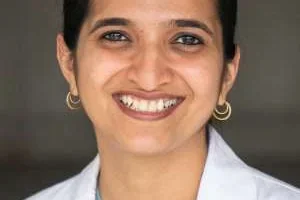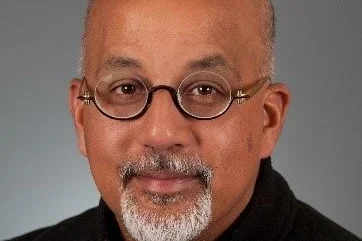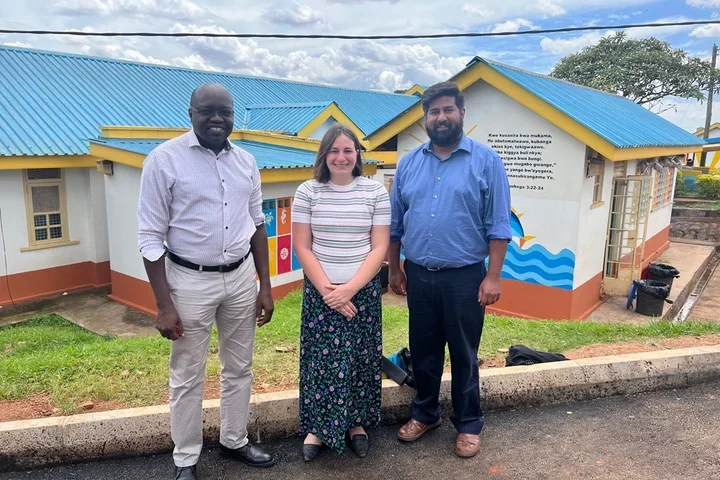2023 Los Angeles Global Health Conference
Approximately 210 attendees joined in person and virtually from around the world
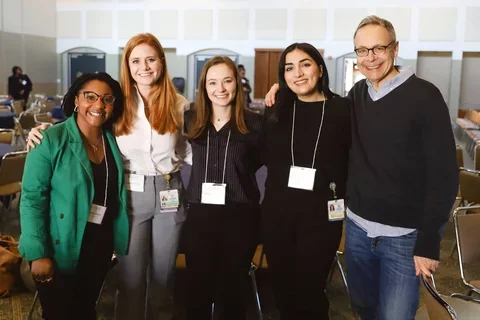
“LAGHC allows for the next generation of global health practitioners to start building the narrative that we want to see in our careers.” —Ahaana Singh, LAGHC Co-Director and DGSOM student
The 7th annual Los Angeles Global Health Conference (LAGHC) Moving towards Global Solidarity: Examining the Shared Impacts of COVID-19 took place on Saturday, January 28, 2023 at UCLA’s Covel Commons. Approximately 210 attendees joined in person and virtually from around the world to learn more about the conference themes of health-system equity, social justice, and public health infrastructure; the promises of digital health technology; and making mental health and well-being a global priority.
LAGHC is organized by students from the schools of medicine, public health, and other disciplines from universities across the region, including UCLA David Geffen School of Medicine (DGSOM), UCLA Fielding School of Public Health (FSPH), USC Institute on Inequalities in Global Health (IIGH), and Kaiser Permanente Bernard J. Tyson School of Medicine (KPSOM). The conference aims to explore health disparities within Los Angeles and worldwide. Home to individuals from more than 140 countries speaking 224 different languages, the rich cultural diversity of Los Angeles makes it an ideal place to examine the current status of world health.
Because the conference is entirely student-run, one of the highlights of sitting on the planning committee is researching accomplished and passionate potential speakers and then connecting virtually with them in the months leading up to the event. Co-Director and first-year DGSOM student Ahaana Singh said, “The amazing thing about LAGHC is that it allows the next generation of global health practitioners to start building the narrative we want to see in our careers. By bringing in unique perspectives from across global health themes, we stimulated dynamic discussions that ultimately emphasized the importance of our core message: solidarity in global health. Putting on this conference with my colleagues and friends has been the biggest highlight of my [short] medical school career so far, and I am endlessly grateful for the opportunity.”
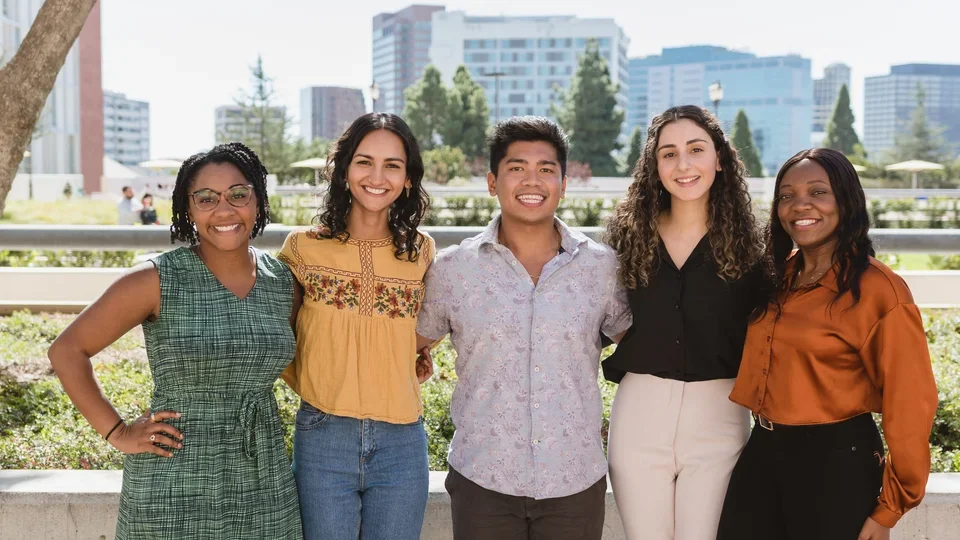
Saturday’s first keynote address, “Achieving Global Solidarity by leading with a Health Equity Lens,” was delivered virtually by Matifadza Hlatshwayo Davis, MD, MPH, and touched on vaccine equity, among other issues. Dr. Davis is Director of Health for the City of St. Louis and a national and international medical contributor on COVID-19 topics. Patricia Gordon, MD delivered the afternoon keynote, “Closing the Gaps: Increasing Global Health Equity for Women Through Innovation Programs for Cervical Cancer Prevention,” and told moving stories of the founding and current work of her nonprofit organization CureCervicalCancer. Dr. Gordon is an alumna of UCLA’s School of Medicine, a longtime radiation oncologist in the LA area, and an international women’s health advocate heralded for her efforts to fight the global epidemic of cervical cancer.
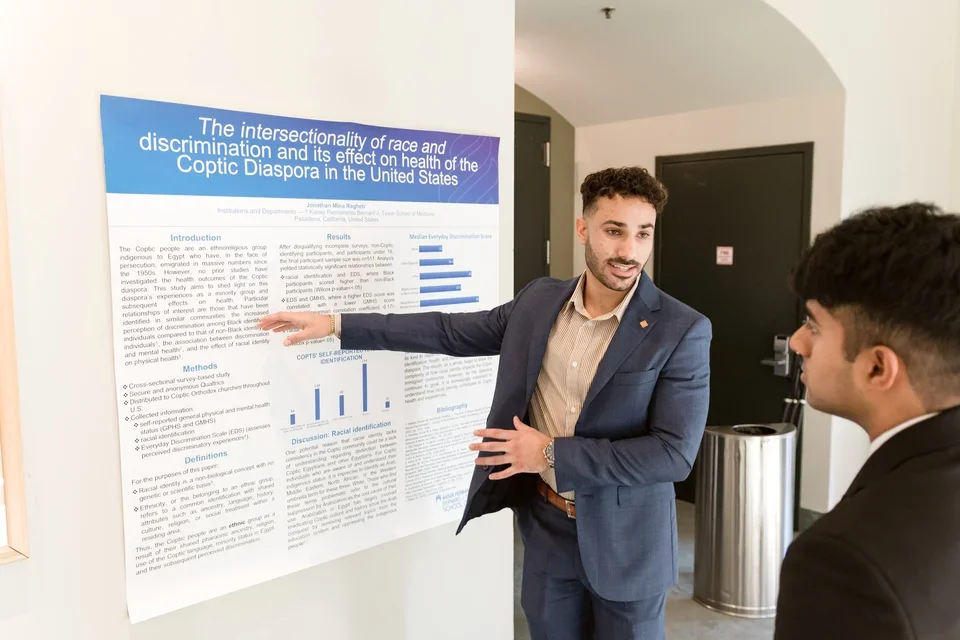
Between the two keynote speeches, conference participants chose among poster presentations, creative art projects, a short film, social and networking events, and numerous breakout sessions related to the conference themes. An advocacy workshop led by Nupur Agrawal, MD, MPH proved to be particularly popular: “While I enjoyed all aspects of the conference, the advocacy workshop highlighted ways in which we can become proactive and act to move towards equity in healthcare, not just on a global scale but also in our local communities,” said conference Co-Director and first-year DGSOM student Oladunni Alomaja. Attendees also praised the breakout session led by Joseph Shin, MD on medical-legal advocacy for migrant rights during the COVID pandemic. Jonathan Ragheb, a KPSOM first-year student who presented a poster, shared, “I particularly enjoyed listening to Dr. Shin’s concerns and contributions regarding migrant health and was inspired by his aspirations for health equity.”
LAGHC wasn’t always a full-day conference. Before 2015, students organized an annual “Global Health Awareness Week” that featured daily lunch talks and culminated in a Thursday night dinner and keynote address. Buoyed by increasing interest, student leaders from DGSOM’s Global Health Interest Group decided to create a one-day conference instead. Although none of the students had experience producing such a large-scale event, their first LAGHC in 2015 drew several hundred participants.
While most speakers were initially local, subsequent years saw an increasing number of national and international speakers. Feedback from participants drove other changes too. Traci Wells, PhD, Director of Education for the Global Health Program (GHP) at DGSOM, explained, “In the early years, there weren’t many opportunities for students to actively engage in networking, and few came away with concrete ideas for how to take the next steps. Students appreciated the conference’s robust discussions about issues but were concerned about the lack of solutions or answers to the question, ‘what can we do about this?’ So this year, in addition to the networking sessions at lunchtime and happy hour, we added an advocacy workshop. Looking forward, our next challenge is finding ways to keep the networks alive between conferences. How do we keep these conversations going?”
Before the pandemic, the conference was always held in person. LAGHC 2022 was an all-virtual affair, and this year marked the first time both an in-person and virtual option were offered. Dr. Wells noted that the hybrid format presented unique issues: “I feel we could better include our colleagues in other countries, given the significant challenge of time differences. We need to think creatively about engaging partners and students committed to health equity no matter where they are in the world.” Still, many considered the hybrid format to be a success. USC Master of Public Health student Jessica Santos, a member of the LAGHC planning committee for two years in a row, could not attend in person and appreciated the flexibility of the virtual option. “I’m grateful that LAGHC has been able to sustain a broader reach by offering a virtual attendance option. Although the energy of an in-person event is lost online, it is inspiring to see how lessons learned throughout the COVID pandemic and last year's fully virtual conference have been applied to increase the accessibility for post-COVID conferences.”
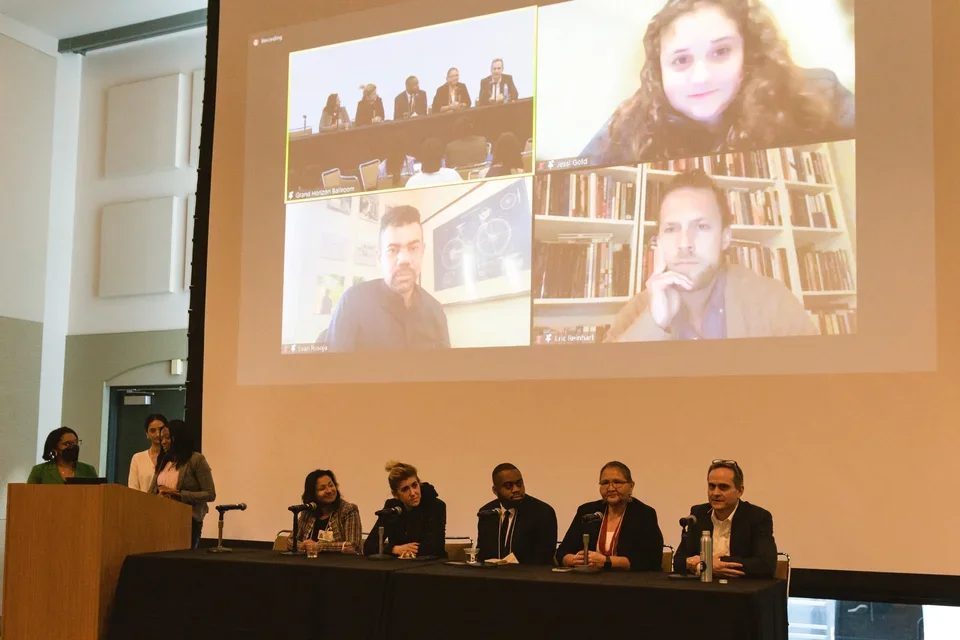
LAGHC 2023 ended with a panel of global health experts who addressed topics such as the shifts in policy and advocacy for vulnerable populations in the wake of the pandemic era and lessons learned from health technology development and innovation. Speaker Committee Chair and first-year DGSOM student Raeven Grant said, “I enjoyed a lot of the sessions, but I think the end of conference panel was my favorite. It was a wonderful, interdisciplinary way to tackle this question about how to move forward together, as clinicians and as humans, in this new era of the pandemic.”
Maryam Farzanegan, PhD, a faculty member at both the UCLA International Institute and the USC Global Medicine Program, says she looks forward to the LAGHC conference each winter. “It’s wonderful to see the fruition and the growth in the young people as well as the collaboration among the different universities and communities.”
Cecily Gallup, MD, MPH, Special Advisor to the Interim Director at GHP, agreed, saying, “We will inevitably face challenges, whether it’s another pandemic, political conflict, climate change or social injustice. That said, having witnessed the curiosity, the passion, and the energy of all the students involved in organizing this day, I’m very optimistic and reassured that we’re in good hands.”
LAGHC would not be possible without its financial sponsors, which this year included UCLA Health International Services, USC Institute on Inequalities in Global Health, UCLA AIDS Institute, UCLA School of Nursing, UCLA International Institute, Charles Drew University School of Nursing, UCLA Anderson Center for Global Management, Claremont McKenna School of Community and Global Health, and UCLA Law Promise Institute for Human Rights. We are deeply grateful for their generous contributions and proud to call this conference a collaborative effort.
Conference session descriptions and speaker bios can be found on the LAGHC website.
Videos from the conference can be viewed online.
